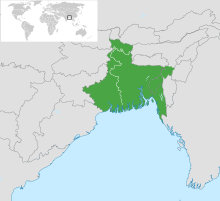
Greater Bangladesh (Bengali: বৃহত্তর বাংলাদেশ, romanized: Brihôttôr Bangladesh), or Greater Bengal (Bengali: বৃহত্তর বাংলা, romanized: Brihôttôr Bangla) is an irredentist ideology that wishes for Bangladesh to expand its territory to include the Indian states that currently has, or historically had, large populations of ethnic Bengali people. These include West Bengal, Bihar, Odisha, and Jharkhand to the west, Sikkim to the north, and the states of Arunachal Pradesh, Assam, Meghalaya, Tripura, Mizoram, Manipur, and Nagaland to the east.
The first and only real attempt at forming such an entity was made in 1943 by the Indische Legion under Bengali Nationalist Subhas Chandra Bose, de facto leader of the Azad Hind movement. Such endeavors, however, failed to ultimately materialize due to Germany and Japan’s loss in World War II.
A related term is "West Bangladesh", which is used by the Indian Hindu nationalist Bharatiya Janata Party leaders to allege that Bengali Hindu regions in India are being Islamised and becoming more similar or amenable to integration with Bangladesh through illegal immigration and political maneuvering.[1][2][3][4][5]
- ^ "How the 'Othering' of Bangladesh Has Been the Backbone of Hindutva's West Bengal Campaign". The Wire. Retrieved 2 September 2023.
- ^ "'Nationalism Versus Regionalism' Emerges Theme of West Bengal's 2021 Election". The Wire. Retrieved 2 September 2023.
- ^ Bhattacharya, Snigdhendu (26 March 2021). "Behind West Bengal's Identity Battles: Rising Population & Economic Pressure". www.indiaspend.com. Retrieved 2 September 2023.
- ^ Snigdhendu Bhattacharya (12 May 2023). "The Politics Of Demography In Assam And West Bengal". Outlook.
- ^ "BJP Accuses Bengal Government Of Trying To Create West Bangladesh". NDTV.com. Retrieved 2 September 2023.